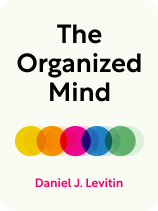

This article is an excerpt from the Shortform book guide to "The Organized Mind" by Daniel J. Levitin. Shortform has the world's best summaries and analyses of books you should be reading.
Like this article? Sign up for a free trial here.
How does memory work in the brain? How does recall involve risk?
The brain uses associative access and the altering of memories to recall something. Together, these properties of memory reinforce Daniel Levitin’s view that keeping and processing complicated information in your head is risky.
Read more to understand how memory works and why we should be cautious.
How Does Memory Work in the Brain?
How does memory work in the brain? Daniel Levitin explains that, each time you encounter a stimulus, you encode a representation (a mental concept) of that stimulus in your brain. When you want to recall that stimulus or concept, you can do so via “associative access,” which means that you can use any number of features to recall that particular stimulus.
For instance, you’ve encountered several balls in your lifetime, so you know what a “ball” is because you have a representation of “ball” in your brain. Using associative access, you could call that representation to mind by thinking about round things, or sports equipment, or things that bounce—all properties of a ball.
Associative access works because the representations of these stimuli are all linked to each other in your brain, and recalling one stimulus automatically activates several other representations.
(Shortform note: In A Mind for Numbers, Oakley explains that you can use the associative nature of memory to your advantage when you’re trying to learn something. The more existing chunks of information you can associate with a new piece of information, the easier it will be for you to remember [presumably because you have more potential stimuli you can use to activate and thus access that information.] For example, say you memorize your friend’s April 28 birthday by noting that she has a mathematical birthday [since 4 x 2 = 8]. If you want to recall your friend’s birthday and know that it’s in April but can’t remember exactly when, recalling that it’s a mathematical birthday might help you think of the exact date.)
Another important feature of memory, according to Levitin, is that, each time you recall something, you risk unintentionally altering the memory—so, when you remember the same event again later, the memory may no longer be accurate. For example, if you have a conversation with both your brother and sister about a dinner you had with just your sister, you may then later misremember that your brother was also there.
How memory works—the associative and alterable nature of memory—explains why, as Levitin notes, keeping and processing complicated information in your head is risky. The fact that certain representations are linked to and thus automatically activate other representations can confuse your brain—which may lead you to make poorer decisions.
For example, if you wanted to buy a house, you might view several properties. If you try to remember every detail of each house instead of writing them down, you might get confused as to which house was which; for example, you may think the house with the black door had a porch when really it was the house with the red door. If porches are important to you, you might then decide to take another look at the house with the black door, only to discover upon arriving at the property that you’re looking at the wrong house. But if you keep a list of each house and its relevant features, you’re less likely to make such a mistake.
(Shortform note: Levitin presents the malleable nature of memory as a problem, but other neuroscientists argue that your brain rewrites memories to help you: It updates the information so that your memories become more relevant to the current moment. Theoretically, this would allow you to make better decisions, although it doesn’t always work out that way in practice if making a good decision relies on accuracy.)

———End of Preview———
Like what you just read? Read the rest of the world's best book summary and analysis of Daniel J. Levitin's "The Organized Mind" at Shortform.
Here's what you'll find in our full The Organized Mind summary:
- The key to living less stressfully in the modern world
- Why our current approach to dealing with stress doesn’t work
- Strategies for sorting and externalizing your thoughts, things, and relationships






